What do our graduates do with their degrees?
- Isaiah Mayo – Bachelor of Science - 2018
- Michelle Slater – Bachelor of Science - 2012
- Chris Perkins – Bachelor of Science - 2012
- Natalie Turner – Bachelor of Science – 2011 (Minor in Marine Biology)
- Steve Auscavitch – Bachelor of Science - 2011
- Katie Arruda – Bachelor of Science - 2011
- Victoria Price – Bachelor of Science – 2010, M.Sc. Oceanography, UConn 2012
- Alex Post – Bachelor of Science - 2009 (Minor in Marine Biology)
- Megan Barker Strand – Bachelor of Arts - 2004
Isaiah Mayo – Bachelor of Science - 2018
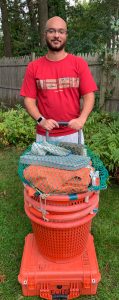 What do you do for a living?
What do you do for a living?
I'm working as an Observer for the Northeast Fisheries Observer Program (NEFOP).
The most interesting thing you’ve done/learned during your marine science career?
How imperative the skills I developed during class are in the real world. Whether it's being able to work in groups to complete a task or being prepared for an oral presentation, these skills have helped me advance in my marine sciences career.
The aspect of the UConn Marine Sciences Program uniquely prepared you for your success?
The UConn Marine Sciences Program prepared me for my success in its structured courses that challenged me to approach real world problems by learning in the classroom and in the field conducting research projects in Long Island Sound.
Michelle Slater – Bachelor of Science - 2012
What do you do for a living?
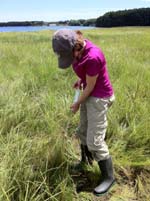 After graduating, I decided to pursue a higher education. I am currently attending the University of New England for a Master's in Marine Science, and am a part of the GK-12 SPartACUS program. I work twice a week in a local school system as a resident scientist. I am currently working on a thesis project studying transport mechanisms for Phragmites australis (the common reed, a type of grass) in the Saco River. This work involves both physical oceanography methods and genetics work in Maine marshes. This particular research is important because Phragmites has both native and invasive lineages. The invasive strain is not a recent introduction; it came from Europe in the late 1700’s or early 1800’s, but it is more robust than the native species, and can significantly alter marshes in their present state. I am extremely interested in bio-physical interactions and wish to continue work involving movements/ transport in the future. My ultimate goal is to work in a setting where I can communicate with other scientists, but also relay scientific research in the public realm, whether that be in an aquarium or museum setting or through publications. Many options exist.
After graduating, I decided to pursue a higher education. I am currently attending the University of New England for a Master's in Marine Science, and am a part of the GK-12 SPartACUS program. I work twice a week in a local school system as a resident scientist. I am currently working on a thesis project studying transport mechanisms for Phragmites australis (the common reed, a type of grass) in the Saco River. This work involves both physical oceanography methods and genetics work in Maine marshes. This particular research is important because Phragmites has both native and invasive lineages. The invasive strain is not a recent introduction; it came from Europe in the late 1700’s or early 1800’s, but it is more robust than the native species, and can significantly alter marshes in their present state. I am extremely interested in bio-physical interactions and wish to continue work involving movements/ transport in the future. My ultimate goal is to work in a setting where I can communicate with other scientists, but also relay scientific research in the public realm, whether that be in an aquarium or museum setting or through publications. Many options exist.
The most interesting thing you’ve done/learned during your marine science career?
I like being able to do research on something that I not only enjoy, but affects decision-making and the local people.
The aspect of the UConn Marine Sciences Program uniquely prepared you for your success?
UConn gave me a solid understanding of how to learn, which is important because we are life-long learners. If I had to pick three things that I especially value from my education it is that I got to do a lot of undergraduate research, I honed my writing skills, and I significantly enhanced my communication skills with all people.
For more information on where Michelle works and what she does……
*University of New England Spartacus GK-12 Program
Chris Perkins – Bachelor of Science - 2012
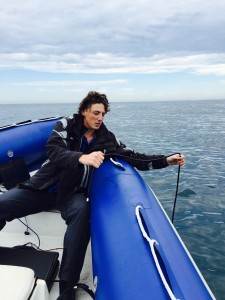 What do you do for a living?
What do you do for a living?
I recently got accepted into an internship program working with the South African Shark Conservancy. I will be in South Africa working with elasmobranchs from October 2012 to January 2013. I have no idea where my career path will take me. I can see myself doing many things. I could go for a Master’s degree and a PhD and end up being a professor at a University, or I could find work as an aquarist somewhere, or I could just end up traveling the world working on different people's grants. The future is wide open for me right now.
The most interesting thing you’ve done/learned during your marine science career?
One position I recently had was an internship position in the Mystic Aquarium. It was great. My favorite part about that position was that I was able to design and implement a training program for their Southern Stingrays, which they are still using even though my internship with them is over.
The aspect of the UConn Marine Sciences Program uniquely prepared you for your success?
There are several important aspects of the program that got me to where I am today. One aspect was the entire capstone class, Science in the Coastal Environment. It taught me to efficiently look for and to distill information related to an argument and present it in a manner that most people can understand, even if they do not have a strong science background. There were also plenty of courses that challenged my problem solving skills and taught me to look at a problem from different angles and to use all of the tools at my disposal to find a solution.
For more information on where Chris works and what he does……
http://www.sharkconservancy.org/
Natalie Turner – Bachelor of Science – 2011 (Minor in Marine Biology)
What do you do for a living?
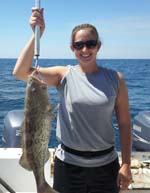 I recently worked as a Shrimp and Reef Fish Fisheries Observer in the Gulf of Mexico and Southeastern U.S. I collect data for NMFS and the Observer Program located at the NOAA Lab in Galveston, Texas, monitor and record catch data aboard commercial fishing vessels, monitor and record marine mammal and sea turtle interactions, and identity and characterize the caught fish species. I have really enjoyed working in fisheries and spending time at sea. I have started looking for something more and would like to be involved in more extensive research. I am applying for a position in the next class for the NOAA Commissioned Officer Corps.
I recently worked as a Shrimp and Reef Fish Fisheries Observer in the Gulf of Mexico and Southeastern U.S. I collect data for NMFS and the Observer Program located at the NOAA Lab in Galveston, Texas, monitor and record catch data aboard commercial fishing vessels, monitor and record marine mammal and sea turtle interactions, and identity and characterize the caught fish species. I have really enjoyed working in fisheries and spending time at sea. I have started looking for something more and would like to be involved in more extensive research. I am applying for a position in the next class for the NOAA Commissioned Officer Corps.
The most interesting thing you’ve done/learned during your marine science career?
The most interesting aspect of my job is everything! Out at sea every day is different and no boat is the same. I love being a part of fisheries management and contributing data that will be used to determine catch quotas and evaluate stocks. I enjoy meeting the fishermen/women and hearing their stories and opinions. It is very different learning about fisheries in a classroom versus actually being involved in the fishing community and seeing it first-hand.
The aspect of the UConn Marine Sciences Program uniquely prepared you for your success?
The UConn Marine Sciences program was instrumental in teaching me about research and research procedures. It prepared me for a job in the field with all of the hands-on research and data collection and analysis techniques. I also learned that while working in a group can be beneficial, it is important to have a strong individual work ethic.
For more information on where Natalie works and what she does……
Contracted by IAP Worldwide Services: www.iapws.com
NOAA Galveston Laboratory: http://www.galvestonlab.sefsc.noaa.gov/
NOAA National Observer Program: http://www.st.nmfs.noaa.gov/st4/nop/
Steve Auscavitch – Bachelor of Science - 2011
What do you do for a living?
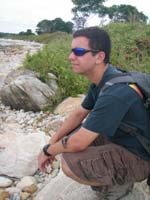 After graduating from UConn in May, 2011 I knew that I wanted to continue on and pursue a research career in academia and immediately go for a Master’s in biological oceanography. In order to gain more field research and teaching experience I applied for an internship at the Cape Eleuthera Institute (CEI) to study the invasive Indo-Pacific lionfish in the Bahamas. Through CEI I was able to do all of this. In my first semester I worked on a project started by the Reef Environmental Education Foundation (REEF) and CEI to monitor changes in patch reef fish assemblages and lionfish abundance locally. I also assisted teaching a research course on lionfish at The Island School, CEI’s neighboring campus for study abroad high school students.
After graduating from UConn in May, 2011 I knew that I wanted to continue on and pursue a research career in academia and immediately go for a Master’s in biological oceanography. In order to gain more field research and teaching experience I applied for an internship at the Cape Eleuthera Institute (CEI) to study the invasive Indo-Pacific lionfish in the Bahamas. Through CEI I was able to do all of this. In my first semester I worked on a project started by the Reef Environmental Education Foundation (REEF) and CEI to monitor changes in patch reef fish assemblages and lionfish abundance locally. I also assisted teaching a research course on lionfish at The Island School, CEI’s neighboring campus for study abroad high school students.
I have since returned to CEI to head up the position of research associate on Queen Conch. Conch have been locally abundant near Eleuthera but populations have been steadily in decline since the onset of heavy fishing in latter part of the 20th century. My goal is to collect data to identify long-term changes in this culturally and economically important species around Cape Eleuthera.
The most interesting thing you’ve done/learned during your marine science career?
While I have gained much practical research experience from UConn and at CEI I have also been introduced to a less well-known facet of the work. Making scientific findings available and interpreting them for the public is just as important as the observations. Starting to use pathways such as social media, blogging, and community outreach about recent developments and potential applications of ocean research is an aspect I hope to expand upon in the near future. Small steps can help move towards enhanced ocean literacy and smart decision making regarding the environment and resources.
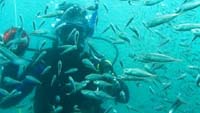 The aspect of the UConn Marine Sciences Program uniquely prepared you for your success?
The aspect of the UConn Marine Sciences Program uniquely prepared you for your success?
The Marine Sciences program at Avery Point offered me opportunities to directly involve myself with ongoing research and obtain skills for my own future research projects. Through the scientific diving program I was able to obtain my American Academy of Underwater Sciences (AAUS) diver certification and immediately apply it in the field. On several occasions I worked with Dr. Peter Auster as a field research assistant to collect data on studies from piscivore ecology at Gray’s Reef National Marine Sanctuary to fish foraging habits at the Aquarius Reef Base in Key Largo, Florida. These projects drove my initial interest into study tropical coral reef ecology.
For more information on where Steve works and what he does……
http://www.ceibahamas.org/
Katie Arruda – Bachelor of Science - 2011
What do you do for a living?
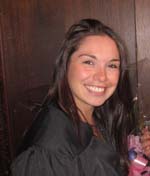 I was employed for a year at the DEP as a Seasonal Resource Assistant on the American Lobster Project and Statistics Program of the Marine Fisheries Division. A few months after graduation, I started as an Environmental Scientist at an Environmental Consulting Firm in Old Lyme, CT. As an environmental scientist, I go to different sites where some form of a release has occurred, usually home heating oil, and collect groundwater samples, soil samples, and send these off to the lab for analysis and I then write the follow up reports based on the lab results and work to clean up the sites.
I was employed for a year at the DEP as a Seasonal Resource Assistant on the American Lobster Project and Statistics Program of the Marine Fisheries Division. A few months after graduation, I started as an Environmental Scientist at an Environmental Consulting Firm in Old Lyme, CT. As an environmental scientist, I go to different sites where some form of a release has occurred, usually home heating oil, and collect groundwater samples, soil samples, and send these off to the lab for analysis and I then write the follow up reports based on the lab results and work to clean up the sites.
The most interesting thing you’ve done/learned during your marine science career?
One of my favorite jobs in my field has been my job with the DEP working with on the lobster project. I would go out "sea sampling" with commercial fishermen where I would analyze every lobster in their traps for health, gender, shell disease, eggs, etc. I would also go out once a week for a plankton tow to analyze the juvenile stages of the American Lobster in Long Island Sound.
The aspect of the UConn Marine Sciences Program uniquely prepared you for your success?
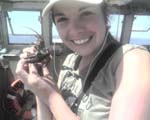 The hands-on experience really helped me get where I am, especially in my current job. My job as an Environmental Scientist involves collecting groundwater samples and soil samples using a lot of the equipment I used in class at Avery Point. In particular, “Measurements and Analysis”, an advanced Marine Sciences course, enhanced my skills in Microsoft Excel, exposed me to a wide variety of sampling equipment and refined my writing technique through the scientific papers, all skills I use every day at work.
The hands-on experience really helped me get where I am, especially in my current job. My job as an Environmental Scientist involves collecting groundwater samples and soil samples using a lot of the equipment I used in class at Avery Point. In particular, “Measurements and Analysis”, an advanced Marine Sciences course, enhanced my skills in Microsoft Excel, exposed me to a wide variety of sampling equipment and refined my writing technique through the scientific papers, all skills I use every day at work.
For more information on where Katie works and what she does……
http://www.cumminsenvirotech.com
Victoria Price – Bachelor of Science – 2010, M.Sc. Oceanography, UConn 2012
What do you do for a living?
While at UConn, I worked with Dr. Peter Auster looking at the use of high resolution sonar (Dual-Frequency Identification Sonar, or DIDSON) to look at fish behavior. Typically, this sort of equipment has only been used in the fisheries world to count passing fish (typically salmon). Because the imagery is so detailed and the unit can be deployed for extended periods of time, we thought that it may be useful to use it to look at predation behavior, predation rates, and species interactions. These behavioral aspects are critical to management but are often poorly understood and not adequately accounted for in management efforts. Now, I'm a contractor for NOAA's Northeast Fisheries Science Center. After the success of using one DIDSON, we are now looking at addressing spatial limitations of the unit by using two units in conjunction with each other-- this allows for a three-dimensional representation. Currently, we are working on taking this setup out of the lab and into the real-world to assess habitat use and species interaction.
My job right now is to write computer programs that will allow the users to identify and measure targets in a three-dimensional space, rather than two-dimensionally as we were restricted to previously. Using DIDSON, we can assign quantitative measures to important behaviors such as habitat use and predation. Being able to quantify behavior allows us to more effectively incorporate these important factors into stock assessments and management decisions.
The aspect of the UConn Marine Sciences Program uniquely prepared you for your success?
As for what the most important aspect of the program is, I think it was the research opportunities. All of the faculty members are very hands-on with students in terms of providing them with research opportunities and allowing students to explore their interests so that they may fine-tune where they want to go in the future. I fully credit where I am now to meeting Dr. Auster and his allowing me to tag along on a research cruise. It provided me with direction and helped me gain confidence in my own investigative abilities that I don't think one can get through classes alone.
For more information on where Victoria works and what she does……
http://swfsc.noaa.gov
Alex Post – Bachelor of Science - 2009 (Minor in Marine Biology)
What do you do for a living?
After I graduated the Marine Sciences program in 2009 I began working for the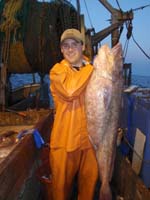 State of Connecticut’s Inland Fisheries Division working with natural and stocked populations of freshwater fish species. Most of my work involved population and distribution studies using electrofishing gear and stationary gillnets and pound-nets. After spending some time fishing in the Florida Keys, I was hired as an At-Sea Monitor and later an Industry Funded Scallop Observer as a contractor to the National Marine Fisheries Service (NMFS) aboard Northeast and Mid-Atlantic commercial fishing vessels. The job duties are collection of scientific, management, and compliance data consisting of identification, handling, and biological sampling of marine fish, invertebrates, marine mammals, sea turtles, and sea birds.
State of Connecticut’s Inland Fisheries Division working with natural and stocked populations of freshwater fish species. Most of my work involved population and distribution studies using electrofishing gear and stationary gillnets and pound-nets. After spending some time fishing in the Florida Keys, I was hired as an At-Sea Monitor and later an Industry Funded Scallop Observer as a contractor to the National Marine Fisheries Service (NMFS) aboard Northeast and Mid-Atlantic commercial fishing vessels. The job duties are collection of scientific, management, and compliance data consisting of identification, handling, and biological sampling of marine fish, invertebrates, marine mammals, sea turtles, and sea birds.
The most interesting thing you’ve done/learned during your marine science career?
While working for NMFS, I was able to travel to the Gulf of Mexico as a Fisheries Observer for the BP Seafood Safety Sampling Program in the wake of the Deepwater Horizon Oil Spill. These experiences provided me with unique opportunities to work with many fish and invertebrate species, in addition to hands on work with whales, dolphins, porpoises, sharks, rays, sea turtles, and seabirds.
The aspect of the UConn Marine Sciences Program uniquely prepared you for your success?
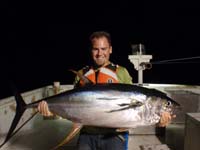 The UConn Marine Sciences program prepared me for these positions due to the strength and flexibility of the program. It provided the strong foundation in aspects of marine science, while allowing the flexibility for me to take classes and explore more specific areas of study. Courses which prepared me for my job as an Observer would be Invertebrate Biology, Reef Fishes, and the Marine Mammals course in conjunction with Mystic Aquarium. I was also able to volunteer, intern, and work for a variety of professor’s labs in the Marine Sciencse facility which gave me hands on experience in different aspects of the marine sciences. I hope to remain in the field of marine fisheries for some time to come, and know that the University of Connecticut’s Marine Sciences program has been the foundation of my success.
The UConn Marine Sciences program prepared me for these positions due to the strength and flexibility of the program. It provided the strong foundation in aspects of marine science, while allowing the flexibility for me to take classes and explore more specific areas of study. Courses which prepared me for my job as an Observer would be Invertebrate Biology, Reef Fishes, and the Marine Mammals course in conjunction with Mystic Aquarium. I was also able to volunteer, intern, and work for a variety of professor’s labs in the Marine Sciencse facility which gave me hands on experience in different aspects of the marine sciences. I hope to remain in the field of marine fisheries for some time to come, and know that the University of Connecticut’s Marine Sciences program has been the foundation of my success.
For more information on where Alex works and what he does……
NOAA National Observer Program: http://www.st.nmfs.noaa.gov/st4/nop/
Megan Barker Strand – Bachelor of Arts - 2004
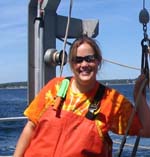 What do you do for a living?
What do you do for a living?
After graduation I started working at Project Oceanology as a part-time, marine science instructor while getting my Masters of Science in Environmental Education with Secondary Science Teacher Certification. After obtaining my Master’s degree, I accepted a full-time marine science instructor position at Project Oceanology teaching up to 50 students about the coastal marine environment. I am also responsible for a grant program, which brings 400 students from around the Connecticut River Valley together to learn about the Connecticut River and Long Island Sound. During this time I obtained my 100 Ton - Master USCG Captains License.
The most interesting thing you’ve done/learned during your marine science career?
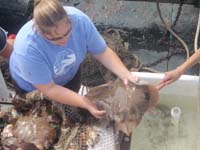 The most interesting aspect of my job is seeing the changes of Long Island Sound annually and seasonally.
The most interesting aspect of my job is seeing the changes of Long Island Sound annually and seasonally.
The aspect of the UConn Marine Sciences Program uniquely prepared you for your success?
An aspect of the Coastal Studies (now Marine Sciences) program that prepared me is its interdisciplinary structure. It allowed me to continue on as a teacher that has social science knowledge of marine fisheries, as well as the biologic and oceanographic view point. This is instrumental in allowing me to teach students about the many facets of the marine environment and their impact on it.
For more information on where Megan works and what she does……
www.oceanology.org
www.facebook.com/pages/Project-Oceanology/119271498190